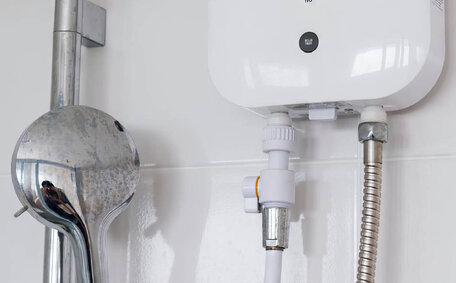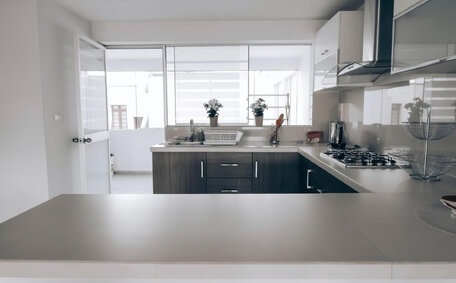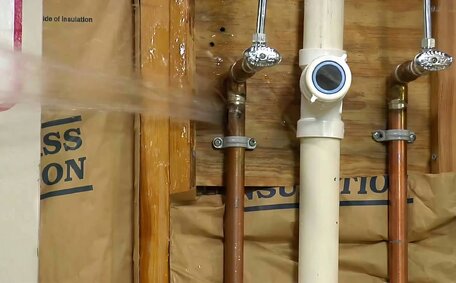Introduction to tankless water heaters
Tankless water heaters, also known as instantaneous or on-demand water heaters, provide hot water without the use of a storage tank. Unlike traditional water heaters that constantly heat and reheat water in a tank, tankless heaters only heat water as it flows through the unit.
Tankless water heaters swiftly raise water temperature as it passes through a heat exchanger. The flow rate—hot water delivered per minute—is contingent on the water heater’s size and heating capacity. Generally, gas tankless heaters provide superior flow rates compared to electric models.
A primary advantage of tankless water heaters is their energy efficiency, potentially reducing energy consumption by half compared to traditional tank systems, leading to cost savings and lower energy bills over time.
Unlike traditional models, tankless heaters can be combined with solar panels to create an eco-friendly setup that supplies hot water on demand, virtually eliminating standby heat loss. Despite this efficiency, they generally have a higher initial cost compared to conventional water heaters.
When considering upgrading to modern hot water systems, it’s wise to evaluate what you need know about your home’s water consumption patterns to tailor the solution to your needs. Heaters can be complemented by storage systems for meeting significant hot water demand, performing admirably in residences needing a stable hot water supply all day. Homes with sporadic daily demand for use hot water may be better suited to a hybrid or high-efficiency storage tank model.
How tankless water heaters work
Tankless water heaters provide hot water on demand by rapidly heating water as it flows through a heat exchanger. Tankless water heaters provide hot water on demand by rapidly heating water as it flows through a heat exchanger.
Cold water is drawn into the heat exchanger, warmed instantaneously by heating coils, and then sent directly to your taps, unlike storage hot water systems where water is reheated in a tank.
Unlike storage tank heaters that constantly reheat a tank of water, the tankless design means water is only heated as needed. Avoiding standby heat loss means tankless units can be up to 50% more efficient in their energy use. They heat water directly without the heat waste associated with a storage tank.
Tankless water heaters excel at providing a ceaseless hot water supply. The unit’s size informs its maximum flow rate—measured in gallons per minute (GPM)—with larger models servicing multiple taps simultaneously.
Tankless water heaters, functioning as an energy saver, have a lifespan of 20 years or more. The lack of a storage tank eliminates corrosion and mineral buildup issues. Maintenance is also simpler - no sediment to flush out.
The combination of longevity and energy efficiency positions tankless heaters as a wise long-term investment.
Benefits of tankless water heaters
Unlike storage tanks that hold a limited amount of pre-heated water, tankless heaters generate a constant stream of hot water on demand.
Energy Efficiency and Cost Savings
A household using about 155 litres (41 gallons) of hot water daily could see annual water heating cost savings of 24% to 34% with a tankless water heater. With rising energy prices, these savings will continue to grow.
Compact, Space-Saving Design
Tankless water heaters are much smaller than traditional hot water heaters, freeing up extra space in your home. Their sleek, wall-mounted design can fit into compact areas and is also easier to maintain without a large hot water tank occupying floor space. The space-saving size gives you more flexibility in installation locations.
Longer Lifespan
On average, tankless water heaters can last longer than 20 years, which is often twice as long as traditional models, thanks to the absence of a storage tank that often succumbs to corrosion and mineral buildup.
Continuous hot water
Energy efficiency
Tankless water heaters enhance efficiency by heating water on demand as it circulates through the system, compared to the constant heating in traditional units. By avoiding standby energy losses associated with heating and re-heating a tank, tankless models use up to 50% less energy.
An average household can save 24% to 34% annually in water heating expenses by switching from a conventional 50-gallon heater to a tankless model. With rising energy prices, these savings will continue to grow over the lifespan of the tankless heater.
The energy efficiency of tankless water heaters makes them an eco-friendly option that saves money on energy bills while reducing your carbon footprint.
Space savings
One of the biggest advantages of tankless water heaters is their compact, space-saving design. Tankless units are much smaller than traditional tank-style heaters, typically about the size of a small suitcase.
Since tankless models lack a bulky storage tank, they can be installed in areas where a traditional tank heater would be impractical. The compact, wall-mounted design offers flexible installation options, ideal for small utility rooms, limited areas, or if you’re keen to maximise basement space.
The smaller footprint of a tankless unit is perfect for smaller homes, apartments, condos, or anywhere you want to maximise space. Their size makes them easier to install and maintain. There’s no large storage tank to take up precious floor area.
Overall, the compact design of tankless water heaters makes them a practical, space-saving option compared to conventional tank heaters that dominate your utility area. You get powerful, consistent hot water without sacrificing valuable room.
Considerations for tankless water heaters
Higher Upfront Cost
The initial purchase price of a tankless water heater is typically higher than a traditional storage tank water heater. Expect to pay anywhere from $600 to $1,500 more upfront for the tankless unit. However, the initial cost energy savings over time can offset much of this cost difference.
Flow Rate Limitations
Tankless heaters provide hot water at a limited flow rate, measured in gallons per minute (GPM). To supply enough hot water for larger homes with multiple taps, a higher capacity unit is needed. Make sure to select a tankless model rated for your household’s peak demand.
Specialised Installation
For optimal operation, tankless heaters need proper installation. While small, point-of-use units are easier to install, installing whole-home units typically requires upgrades to gas lines, exhaust vents, and electrical circuits. It’s advisable to hire professionals with expertise in tankless heater installation.
Upfront costs
Tankless water heaters tend to have a higher upfront cost compared to conventional storage tank water heaters. You can expect to pay $600 to $1,500 more for the initial purchase and installation of a tankless model.
The tankless unit itself will be more expensive, often costing about twice as much as a tankstyle water heater. Installation costs are also greater due to the gas line upgrades, exhaust vents, electrical upgrades, and other modifications required for whole-home tankless heaters.
While the upfront investment is higher, a good quality tankless water heater can save you money over time through energy efficiency and a lifespan of over 20 years. The long-term savings on your utility bills can make up for the initial costs.
you’ll need to know what you need know before investing, like any rebates or incentives available in your region for energy-efficient tankless models, to help alleviate some of the upfront purchase costs. The total costs of installation will depend on the complexity of your existing plumbing and whether any major modifications are necessary.
Limited flow rate
One consideration is do tankless water heaters have sufficient flow rate, which is the amount of hot water produced per minute. Tankless heaters heat water instantaneously as it runs through the unit. But the maximum flow rate depends on the size and power of the model.
Smaller tankless units may only support 1 or 2 water taps at a time. For a whole house system, make sure to choose the water heater best rated for your peak demand. Larger gas tankless heaters can supply over 9 gallons per minute (GPM), enough for multiple showers and taps.
If you use a lot of hot water and your current tank water heater lacks the capacity to meet your needs, upgrading to a more powerful tankless model can provide a continuous flow, even with simultaneous use. Professional Experts can assist in selecting a system your new tankless water heater with ample capacity to service the entire residence.
Installation requirements
For whole-home applications, a professional installation is strongly recommended since significant gas line, electrical, and venting upgrades are usually required.
Tankless water heaters require an increased gas line capacity to meet the on-demand high heating rates. Depending on your existing line size and length, the gas line may need to be replaced with a larger diameter pipe to accommodate the tankless unit’s gas flow requirements.
Unlike the 110-volt circuits for traditional tank models, most tankless heaters need 240-volt electrical circuits to perform effectively. An electrical upgrade ensures the heater has sufficient power for optimal performance. Proper wiring and grounding is also critical for safety.
Since tankless heaters lack a storage tank, they require direct venting to the outdoors for combustion gases. Professional installers can determine the necessary vent configuration and termination point to meet local building codes.
Other considerations include the number of fixture units, calculated peak demand, fuel type and availability, and water quality. Hiring qualified professionals familiar with tankless water heater installations will ensure your system is correctly sized, powered, ventilated and positioned for maximum efficiency and convenience.
For whole-home applications, a professional installation is strongly recommended since significant gas line, electrical, and venting upgrades are usually required.
Proper wiring and grounding is also critical for safate, measured in gallons per minute (GPM). Check the tankless model’s capacity rating to ensure it can handle peak demand.
Water usage habits are also important. Homes with clustered demand - multiple showers at once - need more heating power than sporadic use throughout the day. Cooler groundwater temperatures in some regions can also lower the tankless heater’s performance.
Professional installers can help ensure your water temperature needs are met, calculating your exact requirements and properly sizing the tankless unit using gallons per minute (GPM), temperature rise, and other specifications. Correctly sizing your tankless water heater prevents frustrating performance issues while maximising efficiency.
An undersized unit will struggle to supply adequate hot water, especially during peak demand times. But an oversized tankless heater wastes energy and money.Households with more bathrooms or heavy usage require a higher flow rate, measured in gallons per minute (GPM).
Comparing gas vs electric models
When choosing between gas and electric tankless water heaters, there are pros and cons to consider for each fuel type:
Gas Tankless Water Heaters
Gas tankless heaters are generally more energy efficient than electric models. Gas models also provide higher flow rates, so they can supply hot water to multiple fixtures at the same time. This makes gas a good option for larger households.
However, gas tankless heaters have higher upfront installation costs since gas lines likely need to be installed or upgraded. Venting is also required for gas models.
Electric Tankless Water Heaters
Electric tankless units, which utilise a different fuel source than gas models, are simpler to install as long as your electrical panel can handle the load. They can be plugged into a 240-volt outlet without new electrical work or venting.
But an electric tankless water heater has lower flow rates than gas units. Whole home electric tankless can struggle to meet high demand. Electric tankless may work better for point-of-use applications.
Consider your existing infrastructure, fuel availability, and hot water needs when deciding between gas electric tankless heaters.
When choosing between gas and electric tankless water heaters, there are pros and cons to consider for each fuel type:
Gas tankless heaters are generally more energy efficient than electric models.
Venting is also requiredndicate that tankless water heaters offer certain benefits but also have some downsides to consider. The continuous on-demand hot water is a major advantage, elems are critical factors to consider. Limited flow rates may also mean tankless heaters struggle to meet high demand in larger households. Careful sizing is important to ensure adequate hot water supply.
Overall, heaters tankless are best suiters may be a better solution.
Consider your specific needs and talk to the experts at Bexley Plumbing to see if a tankless water heater is right for you. Get in touch today to discuss your options or book an installation quote.






